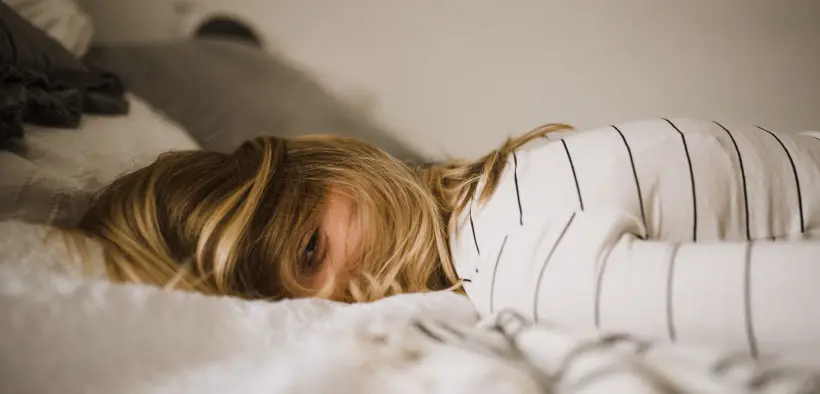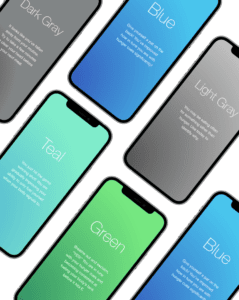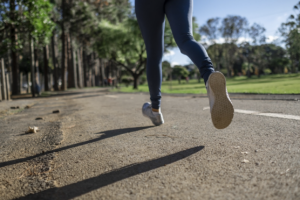How To Get Less Stressed

‘Tis the season… to be stressed? Sure, December is full of pretty lights, presents, good food, and extra family time (like we haven’t had enough of that this year! But ANYWAY…). Even with all these joys, the holiday season can be one of the most stressful times of year even when we’re not in the midst of a pandemic. However, stress can be controlled to a degree, and managing your own stress levels is one of the best gifts you can give to yourself for the holidays. Below are my top 4 tips to get less stressed and to have a more pleasant holiday season.
The Sleep and Stress Connection
Sleep affects stress and stress affects sleep. It’s a doozy! When you’re feeling heightened pressure and anxiety, your sleep quality and duration suffer. Ever get up to pee in the middle of the night only to have your brain start racing? Or how about not being able to fall asleep because you can’t switch your brain off? Yep, that good ol’ stress rascal. Likewise, when you don’t sleep well enough or for long enough, your ability to handle stress weakens. It’s a vicious cycle. The good news? There is more in your control than you think when it comes to getting better sleep and being less stressed as a result.
Get less stressed: Stop binging on TV shows at night.
I know it seems like I’m telling you to sprout wings and fly (or something equally as impossible) but hear me out: the last week of December tends to be slow and lazy for most. Can you allocate the end-of-December downtime towards starting that new series, instead of binge watching shows at night over the next week or two? Consider it, because for every hour of sleep that you lose, your ability to think properly and respond quickly gets compromised. Your cardiovascular health, energy, and ability to fight infections also diminishes.
Put the screens away at least 30 minutes before you go to sleep.
It’s not just the shows keeping you up, it’s the blue light from the television, tablet, and phone screens that suppresses the production of melatonin and interferes with your circadian rhythm. Not to mention the content – ever read a Facebook comment you disagree with right before hitting the sack? The last thing you want is to stimulate your brain right before bed. Best to put the screens away and reach for a book or magazine instead. Less stress will be worth it.
Try to exercise in the morning and earlier part of the day rather than in the late afternoon and evening.
There is plenty of evidence showing that exercise can either help our sleep or inhibit it, and that timing matters. According to sleep.org, studies have found that “people who work out on a treadmill at 7:00am sleep longer, experience deeper sleep cycles, and spend 75 percent more time in the most reparative stages of slumber than those who exercise at later times that day.” If you exercise outside, you get an added bonus of getting a daily dose of sunshine, which can help regulate your sleep/wake cycle. Another benefit of working out in the morning? You’re more likely to make it happen before other obligations pop up and steal your time away later in the day.
Breathe Out For Less Stress
Everyone breathes, but is your breathing working to help you get less stressed? Turns out “breathing exercises” sound more complicated than they actually are (at least that’s the reason I avoided them for so long – I can’t be the only one worried about counting incorrectly!). Keep it simple and focus on your exhale. Make sure to exhale fully and as slowly as you can. It’s the slow and full exhale that’s responsible for slowing your heart rate, reducing your blood pressure, and eliminating any excess carbon dioxide, something that can negatively affect your nervous system.
The inhale breath can be a normal inhale through your nose, no need to force it in, but again, slower is always better. Research shows the optimal rate of breaths per minute to be 6, but I wouldn’t focus on that. Just see if you can devote a few minutes a day to slow breathing, with emphasis on a slow and full exhale.
Eat Slower to Get Less Stressed
Looks like “slow” is the theme here! And for good reason. Ever notice that when you’re especially stressed you tend to eat more quickly? Many studies show that fast eaters are twice as likely to be or become overweight or obese than slow eaters. That’s because it can take up to 20 minutes for your brain to receive the signal that you’re full. If you’re eating quickly you won’t recognize when you’re full, which can lead to eating more than needed.
Eating fast is also linked to a higher risk of developing insulin resistance and diabetes. The good news is that eating slow is a habit and it’s one you can acquire with proper awareness and effort.
Try this: Next time you’re at a meal, set a timer and see how long it takes you to eat. Then set a timer for a couple minutes longer the next time you eat a meal. Keep increasing the time until you get to 20 minutes per meal.
Just Say No
Lastly, learn to say “no” to things you don’t absolutely have to do. Women especially are taught to be selfless and giving… often to a fault. Always meeting other people’s needs while ignoring your own can lead to high stress and burnout. Remember, you’re not a bad person for knowing your limits, and not taking on more than you can comfortably handle. Saying no can be an effective form of self care.
If you find it hard to say no, ask yourself why! Are you afraid that saying no will anger someone, make them not like you, or be a reflection of your productivity and self worth? You are enough as you are, and you matter too. And hey, you’re actually being smarter by saying no to things you don’t really want to do or have time for, because it means you’re investing your time and energy more wisely. When you say “no” to some things it opens up the opportunity to say “yes” to other things that matter more. Saying no is a great way to get less stressed.
Remember, you can control your reactions to stress!
Stress is a positive feedback loop: it builds upon itself unless you take active measures to quiet it down. You can’t control what happens, but you can control how you react to it. Do whatever you can to take care of yourself this holiday season so that you’re less stressed and in the best physical and mental shape to tackle whatever comes your way.
About Shapa:
Looking to sleep better, eat a bit healthier, build a practice of self-care, or just want to feel more energetic each day? Let Shapa be your virtual coach. Shapa focuses your program based on YOUR lifestyle and YOUR goals so you can build healthy habits and achieve lasting results. Learn more about the Shapa difference.
About the author:
Sharone completed her Masters of Science in Nutrition and Education at Columbia University. Having overcome her own not-so-great relationship with food, she is passionate about helping others achieve their health and weight loss goals while finding balance. She enjoys hanging out with her two daughters, husband, giant dog, and cat, especially all together when shenanigans are involved. To learn more about scheduling a nutrition counseling session with Sharone, click here. For more tips and tricks for nutritious living, check out Sharone’s Instagram and Twitter.
Check out more of Sharone’s articles on the Shapa Blog here.




